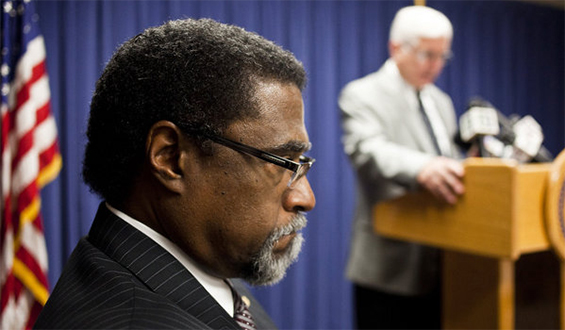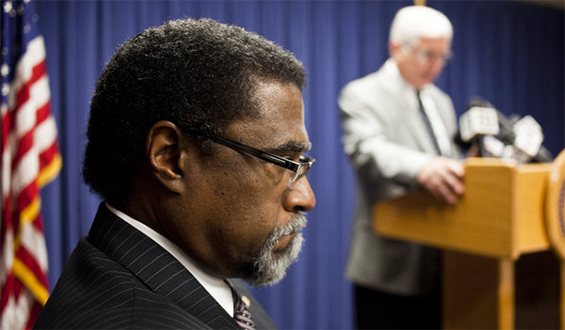
Darnell Earley will step down from his role as state-appointed emergency manager of Detroit Public Schools at the end of this month.
Governor Rick Snyder made the announcement earlier last week, confirming Earley’s intention to leave the position on February 29. According to state emergency manager law, his term runs through June 2016.
“Darnell has done a very good job under some very difficult circumstances,” Snyder said in a statement. “… He restructured a heavily bureaucratic central office, set in place operating and cost-containment measures, and has taken steps to stabilize enrollment. These factors should all set the course for a sustainable, new Detroit Community Schools, as I have proposed.”
In a letter submitted to Snyder, Earley said that health care costs would be kept at “a manageable level,” and enrollment in the DPS school system is expected to stabilize over the next two years. He went on to discuss an annual audit of the district that found revenue and operating costs would have resulted in a $13 million fund balance for the 2014-15 school year. However, the district required a $57 million per year for debt service payments. He said that until the issue was resolved, “the district will be rendered insolvent.”
Earley also mentioned that measures taken to address the district’s structural deficit in its operating budget, in addition to other tasks, were ahead of schedule, saying he had already completed the comprehensive restructuring that was needed to downsize the central office as well as the creation of a network structure meant to place more resources into classrooms. Earley added that Governor Snyder had agreed with him in the goal that he should be the final emergency manager for the district, reports Lorenzo Ferrigno for CNN.
Snyder plans to find a transitional leader before the end of the month. The district has been under emergency management for the past seven years.
Democratic lawmakers pushed for Earley’s resignation. They disapprove of the emergency manager law, arguing that it offers too much financial power to the state throughout municipalities and school districts. They argued that the district still had too many problems, such as the teacher sick-outs forcing schools to close over complaints about dilapidated buildings and troubled finances, and were unhappy concerning his role in Flint.
In the meantime, Snyder is pushing for legislation before the state Senate that would result in over $700 million and eliminate $515 million in legacy school debt in addition to offering $250 million for operations of a new school district. If the bills pass, an interim Board of Education would be appointed by the state to oversee the new district with an interim superintendent being appointed for this year. An elected city Board of Education would be chosen through the November election to oversee the district beginning in 2017.
In addition to being emergency manager, Earley had been one of five public officials who had been invited to testify before the House Oversight and Government reform panel on a hearing that would investigate the Flint water crisis as well as the role of the US Environmental Protection Agency. However, he is refusing to attend, and the committee no longer expects any other public officials to attend.
According to Ann Zaniewski for The Detroit Free Press, the committee has plans to subpoena Earley in an effort to force him to testify on the issues.




